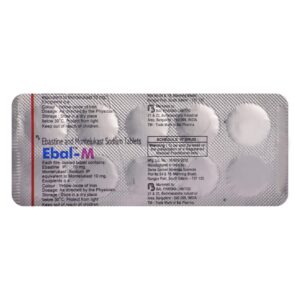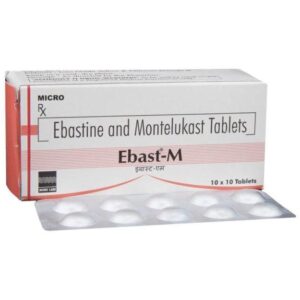MONTELUKAST + EBASTINE
Montelukast: Montelukast is a medication classified as a leukotriene receptor antagonist. It is used for the treatment of asthma and seasonal allergies.
Mechanism of Action:
Montelukast works by blocking the action of leukotrienes, which are chemicals in the body that cause inflammation in the airways and other allergy-related symptoms. By blocking leukotrienes, Montelukast helps to prevent asthma attacks and relieve symptoms such as wheezing, coughing, and shortness of breath.
Use:
Montelukast is primarily used to manage asthma symptoms in adults and children aged 12 months and older. It can also be used to prevent exercise-induced bronchoconstriction. Additionally, it is used to relieve symptoms of seasonal allergic rhinitis, such as sneezing, itching, and a runny nose.
Dose:
The recommended dose of Montelukast varies depending on the age and condition being treated. For asthma treatment in adults and adolescents aged 15 years and older, the standard dose is 10 mg once daily. For children aged 6 to 14 years old, the typical dose is 5 mg once daily. For seasonal allergic rhinitis, the recommended dose is 10 mg once daily for adults and children aged 15 years and older, and 5 mg once daily for children aged 2 to 14 years old.
Side Effects:
Some common side effects of Montelukast may include headache, gastrointestinal disturbances (such as diarrhea and stomach pain), dizziness, and fatigue. Additionally, there have been rare reports of behavioral changes, mood swings, and suicidal thoughts in individuals taking Montelukast. It is important to contact a healthcare professional if any unusual or concerning symptoms occur.
As with any medication, it is vital to follow the prescribed dose and consult with a healthcare professional if there are any questions or concerns about using Montelukast.
Ebastine: Ebastine is an antihistamine drug used to relieve symptoms associated with allergies, such as itching, sneezing, runny nose, and watery eyes. It is primarily used for the treatment of seasonal allergic rhinitis and chronic urticaria (hives).
The mechanism of action of Ebastine involves blocking the effects of histamine, a substance produced by the body during an allergic reaction. Histamine is responsible for causing the symptoms of allergies by binding to histamine receptors. By blocking these receptors, Ebastine reduces the allergic response and provides relief from symptoms.
The typical dose of Ebastine for adults is 10 mg once daily, orally. However, the dosage may vary depending on individual factors such as the severity of symptoms and the patient’s response. It is important to follow the dosage instructions provided by a healthcare professional.
Some common side effects of Ebastine include drowsiness, fatigue, headache, dry mouth, nausea, and gastrointestinal disturbances. These side effects are usually mild and transient. However, certain individuals may experience more severe adverse effects such as difficulty breathing, palpitations, or allergic reactions. If any severe side effects occur, it is important to seek immediate medical attention.
It is worth noting that Ebastine may interact with other medications, so it is important to inform a healthcare professional about any other drugs being taken. Additionally, pregnant or breastfeeding women, as well as individuals with certain medical conditions, may need to exercise caution or avoid using Ebastine. As always, it is recommended to consult with a healthcare professional for specific advice and guidance regarding the use of this medication.


